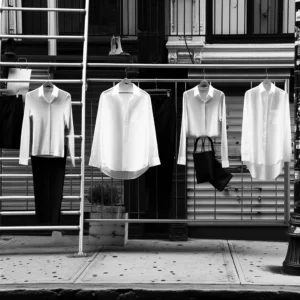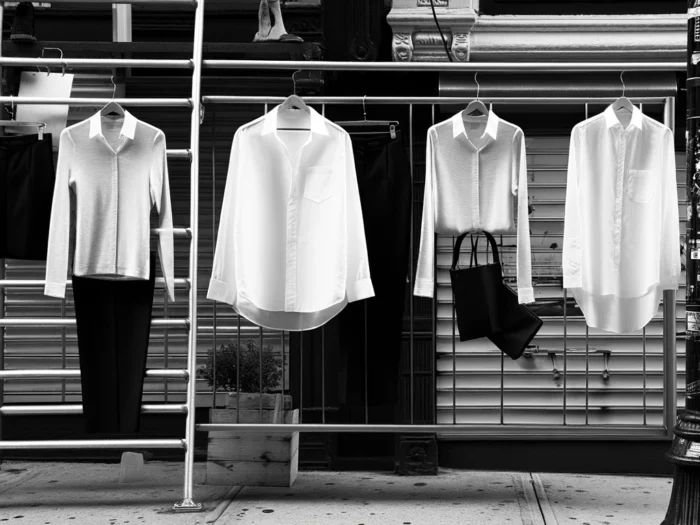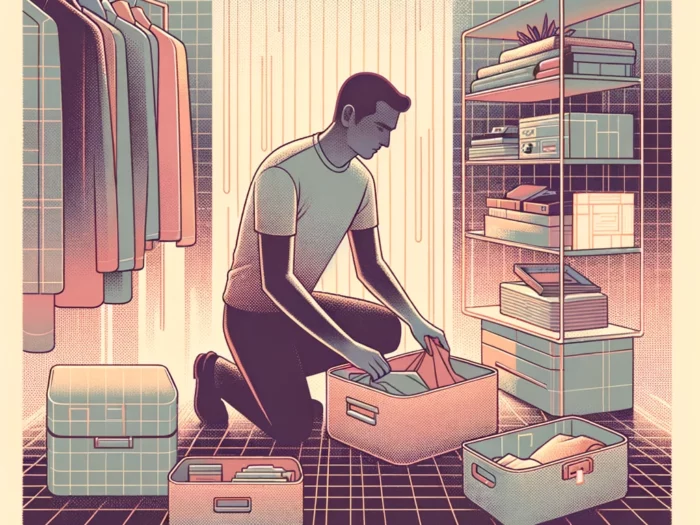The minimalist movement, once a niche philosophy, has surged to the forefront of modern culture, influencing everything from home design to our daily routines. One of its most profound impacts has been on the fashion industry. Gone are the days when wardrobes were overflowing with seldom-worn pieces and impulse buys. Today, there’s a growing appreciation for curated collections of clothing that not only reflect personal style but also align with sustainable and intentional living.
Choosing a minimalist wardrobe is more than just a fashion statement; it’s a commitment to quality over quantity. It’s about understanding the value of each item, how it fits into your life, and the joy of wearing pieces that truly resonate with who you are. The benefits are manifold: a decluttered closet, less decision fatigue, more financial savings, and a reduced carbon footprint.
Understanding Minimalist Principles
At its core, minimalism is about seeking simplicity. It’s a journey of distilling things down to their essence, of finding clarity amidst the chaos. This philosophy encourages us to strip away the superfluous, to focus on what truly matters, and to find contentment in the present.
In the context of fashion, minimalism challenges the traditional notions of consumerism. It’s not about having the latest trends or the most extensive collection. Instead, it’s about carefully selecting pieces that align with your personal style, that are versatile and durable, and that bring you joy with every wear. It’s a celebration of individuality, of recognizing that style is deeply personal, and that the best wardrobes are those that are curated with intention and purpose.
- The Benefits of a Minimalist Wardrobe
- Assessing Your Current Wardrobe
- Decluttering Your Closet
- Defining Your Personal Style
- Essential Pieces for a Minimalist Wardrobe
- Investing in Quality Over Quantity
- Maintaining a Minimalist Wardrobe
- Overcoming Challenges
- Inspiring Minimalist Fashion Icons and Brands
- Conclusion
- Additional Resources
The Benefits of a Minimalist Wardrobe
Financial Savings
One of the most immediate benefits of adopting a minimalist wardrobe is the positive impact on your wallet. By investing in quality pieces that are versatile and timeless, you reduce the need for frequent shopping trips. Over time, this approach can lead to significant savings. Instead of succumbing to fast fashion’s allure and its endless cycle of buying and discarding, you’ll find yourself purchasing less but choosing better.
Environmental Impact
The fashion industry, particularly the fast fashion segment, is notorious for its environmental footprint. From water consumption to waste, the impact is staggering. By opting for a minimalist wardrobe, you’re not just making a personal statement; you’re also taking a stand for the planet. Fewer purchases mean reduced demand for production, leading to a decrease in the associated environmental degradation. Moreover, by choosing sustainable brands and materials, you further minimize your ecological impact.
Mental Clarity and Reduced Decision Fatigue
Every item in a minimalist wardrobe is chosen with intention. This means that each morning, instead of being overwhelmed by choices, you’re presented with a curated selection of items that you love and that fit well. This reduces the mental load of deciding what to wear, leading to a clearer mind and a more focused start to the day. Over time, this can significantly reduce decision fatigue, allowing you to channel your energy into more meaningful tasks.
Time-Saving
We’ve all experienced those mornings – standing in front of a bursting wardrobe, feeling like we have nothing to wear. With a minimalist approach, this paradox is eliminated. Since every piece is versatile and chosen to fit seamlessly with the rest of your collection, putting together outfits becomes a breeze. This not only saves precious morning minutes but also eliminates the need for emergency shopping trips when you feel like you have “nothing to wear.”
In essence, a minimalist wardrobe is more than just a style choice; it’s a lifestyle shift. It’s about recognizing the value in simplicity, in quality over quantity, and in making choices that benefit not just ourselves but the world around us.
Assessing Your Current Wardrobe
The Importance of Taking Stock
Before diving into the minimalist wardrobe journey, it’s crucial to understand where you currently stand. Taking stock isn’t just about counting items; it’s about assessing the role each piece plays in your life. This introspective process lays the foundation for the changes you’re about to make, ensuring they’re both meaningful and lasting.
Tips for Evaluating What You Own
- Does it Fit? It might sound basic, but many of us hold onto items that no longer fit, hoping they might one day or reminiscing about times when they did. A minimalist wardrobe is about the present. If it doesn’t fit now, it doesn’t belong.
- Do You Wear It? That sequined dress might be stunning, but if it’s been gathering dust for years, it’s time to reassess its place in your closet. Aim for pieces that you regularly reach for and that suit your current lifestyle.
- Does it Make You Feel Good? Clothing isn’t just functional; it’s deeply personal. Every item in your minimalist wardrobe should make you feel confident and authentic. If a piece doesn’t resonate with who you are, it’s time to part ways.
Decluttering Your Closet
Step-by-Step Guide to Decluttering
- Start Small: Instead of tackling the entire wardrobe at once, start with specific categories—like shoes, tops, or accessories. This makes the process more manageable and less overwhelming.
- Create Piles: As you assess each item, create distinct piles: keep, donate, sell, and recycle. This will help streamline the next steps.
- Try the Hanger Trick: Turn all your hangers in one direction. After wearing an item, turn its hanger the opposite way. After a few months, items still facing the original direction are ones you might consider parting with.
The Emotional Challenges of Letting Go
Decluttering isn’t just a physical process; it’s an emotional one. Many items carry memories, hopes, or sentiments. Recognize that letting go of the item doesn’t mean letting go of the memory. It’s about making space—both physically and emotionally—for the present and future.
Practical Tips for Selling, Donating, or Recycling Unwanted Items
- Selling: Platforms like Depop, Poshmark, or local consignment stores can be great places to sell gently used items. Remember to present your items well with clear photos and descriptions.
- Donating: Consider local charities, shelters, or community centers. Some organizations even offer pick-up services for convenience.
- Recycling: For items too worn to sell or donate, look for textile recycling programs in your area. Many brands also offer recycling initiatives, turning old garments into new products.
By taking a thoughtful and intentional approach to decluttering, you’re not just creating a minimalist wardrobe; you’re also embracing a mindset of living with purpose and intention.
Defining Your Personal Style
The Importance of Knowing Your Style for a Successful Minimalist Wardrobe
Understanding and embracing your personal style is the cornerstone of building a minimalist wardrobe that truly resonates with you. It ensures that each piece you own not only serves a functional purpose but also aligns with your aesthetic preferences and lifestyle. This clarity reduces the chances of impulse purchases and ensures that your wardrobe remains cohesive and versatile.
Tips and Exercises to Define Your Personal Style
- Mood Boards: Utilize platforms like Pinterest or physical magazine cutouts to create a mood board. This visual representation can help you identify patterns, colors, and styles you’re consistently drawn to.
- Wardrobe Audit: Identify the pieces you wear most often. These are likely indicative of your natural style inclinations.
- Style Icons: Think of individuals whose style you admire, whether they’re celebrities, influencers, or even people in your daily life. Analyzing what you like about their style can offer insights into your own preferences.
Essential Pieces for a Minimalist Wardrobe
Basic Items Every Minimalist Wardrobe Should Have

While the specifics can vary based on individual preferences, some universally versatile items include:
- A White Button-Down Shirt: Perfect for both casual and formal settings.
- Classic Denim Jeans: A staple that can be dressed up or down.
- A Neutral Blazer: Adds a touch of professionalism to any outfit.
- Comfortable, Stylish Flats: Ideal for daily wear while still looking polished.
- A Little Black Dress: A timeless piece suitable for various occasions.
Adapting Essentials Based on Personal Style, Climate, and Lifestyle
While the above list provides a foundation, it’s essential to adapt your wardrobe essentials based on your unique circumstances:
- Personal Style: If you lean towards bohemian styles, your essentials might include flowy skirts or layered necklaces. If you’re more athleisure-oriented, quality leggings and versatile sneakers might be your go-to.
- Climate: Those in colder climates might prioritize quality knitwear and sturdy boots, while those in warmer areas might focus on breathable fabrics and open-toed shoes.
- Lifestyle: A corporate professional’s essentials will differ from someone in a creative field. Ensure your wardrobe aligns with your daily activities and requirements.
Investing in Quality Over Quantity
The Long-Term Benefits of Buying High-Quality Items
Investing in high-quality clothing might seem counterintuitive from a cost perspective initially. However, in the long run, these pieces often prove to be more cost-effective. They tend to last longer, retain their shape, and resist wear and tear, reducing the need for frequent replacements. Moreover, quality items often provide a better fit and finish, elevating your overall look.
Tips for Assessing the Quality of Clothing
- Fabric: Natural fabrics like cotton, wool, and silk often outlast synthetic materials. Check the clothing label for fabric composition.
- Stitching: Examine the seams and hems. Even stitching without loose threads indicates good craftsmanship.
- Hardware: Zippers, buttons, and other hardware should feel sturdy and function smoothly.
- Reviews: If shopping online, customer reviews can provide insights into the item’s durability and quality.
Maintaining a Minimalist Wardrobe
Seasonal Checks and Decluttering
Every season, take some time to go through your wardrobe. Remove items that no longer fit, are damaged, or that you haven’t worn in the past year. This regular audit ensures your wardrobe remains streamlined and functional.
The “One In, One Out” Rule
To maintain a minimalist wardrobe, adopt the “one in, one out” principle. Whenever you add a new piece to your collection, ensure you let go of another. This practice prevents accumulation and helps maintain a curated wardrobe.
Caring for Your Clothes to Ensure Longevity
- Follow Care Labels: Adhering to washing and drying instructions can significantly extend the life of your clothes.
- Store Properly: Use padded hangers for delicate items, and avoid overstuffing drawers.
- Protect: Use garment bags for special occasion wear and consider moth repellents for woolen items.
Overcoming Challenges
Addressing Societal Pressures and the Allure of Fast Fashion
In today’s world, with ever-changing fashion trends and the constant bombardment of new collections, resisting the allure of fast fashion can be challenging. However, it’s essential to remember the environmental and ethical implications of fast fashion. Instead of succumbing to every trend, focus on building a timeless wardrobe that reflects your personal style.
Staying True to Your Minimalist Principles in a Consumer-Driven World
Stay informed about the benefits of minimalism, both for personal well-being and the environment. Join communities or follow influencers who promote sustainable fashion. Their insights and experiences can serve as a constant reminder and motivation to stay committed to your minimalist journey.
Inspiring Minimalist Fashion Icons and Brands
A Look at Individuals and Brands That Embody Minimalist Fashion Principles
From iconic figures like Audrey Hepburn and Steve Jobs to contemporary fashion influencers, there are many individuals who’ve embraced minimalist fashion throughout the years. Their style, characterized by timeless pieces and a limited color palette, proves that simplicity can be both chic and impactful.
Brands like Everlane, COS, and Uniqlo have also championed minimalist fashion, offering collections that prioritize quality, sustainability, and timeless design over fleeting trends.
How They Can Serve as Inspiration for Your Own Journey
Studying the style choices of minimalist fashion icons can provide valuable insights into building your own wardrobe. Their commitment to simplicity, quality, and authenticity can serve as a blueprint for those looking to curate a meaningful and functional wardrobe.
Conclusion
Reflecting on the Transformative Power of a Minimalist Wardrobe
Adopting a minimalist approach to fashion is not just about decluttering or saving money. It’s a transformative journey that can lead to greater self-awareness, a deeper understanding of one’s personal style, and a more sustainable lifestyle. By prioritizing quality over quantity and intentionality over impulse, we can cultivate a wardrobe that truly resonates with who we are.
Encouraging Readers to Start Their Journey Towards Fashion Simplicity and Intentionality
Fashion is an extension of our identity. By choosing to embrace minimalism, we’re making a statement about who we are and the values we hold dear. So, take the leap, start your minimalist fashion journey, and discover the joy of simplicity.
Additional Resources
Recommended Books, Blogs, and Documentaries on Minimalist Fashion
- Books: “The Curated Closet” by Anuschka Rees, “Essentialism: The Disciplined Pursuit of Less” by Greg McKeown.
- Blogs: Un-Fancy, Style Bee, The Minimalist Wardrobe.
- Documentaries: “The True Cost,” “Minimalism: A Documentary About the Important Things.”
Brand Recommendations for Quality, Sustainable Clothing
- Everlane: Known for transparency and quality basics.
- COS: Offers timeless designs with a modern twist.
- Uniqlo: Japanese brand emphasizing simplicity and functionality.
- Patagonia: Outdoor brand with a strong commitment to sustainability and ethical practices.









